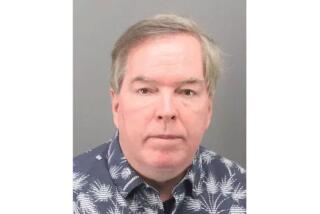Defendant Denies Mailing Letters in ‘Pay or Die’ Scheme
- Share via
After more than a year in jail and several weeks of trial testimony, a former Lancaster aerospace worker took the witness stand in San Fernando Superior Court on Tuesday for the first time and denied mailing extortion letters to hundreds of prominent Antelope Valley residents.
Richard Faroni’s testimony painted the prosecution’s case as being built on misinterpretation of innocent acts.
The “pay-or-die” letters mailed in late 1988 demanded millions of dollars, but no money was ever collected. Faroni, 27, was charged along with 28-year-old Roman Makuch with attempted extortion and conspiracy, based on evidence of surveillance and other activities that prosecutors portrayed as incriminating.
Judge Ronald S. Coen rejected a motion to dismiss the case two weeks ago, saying the prosecution had convinced him the defendants are guilty.
On Tuesday, Faroni contradicted prosecution testimony that he bragged about an ongoing surveillance project, saying he conducted surveillance activity only once when he used a camera and tape recorder to spy on a neighbor with whom he was feuding. And he denied owning a long-range listening device known as a “big ears,” which a neighbor said he saw the defendants load into a car before late-night drives, during which prosecutors believe they gathered information on victims.
Faroni said he owned an old-fashioned flashbulb holder that could be mistaken as a long-range microphone. He also testified that he never heard of some of the prominent letter recipients--including two well-known hotel owners and a Lancaster businessman who is the chairman of the state Republican Party--until after his arrest.
“I don’t get into politics,” Faroni said.
Deputy Dist. Atty. Steven L. Cooley has asserted that Faroni and Makuch had a motive for the extortion plot because they were angry that local leaders had failed to support the Antelope Valley Film Commission, on which they worked as volunteers.
Faroni, who was known to friends as “Rocky” while Makuch was known as “Bullwinkle,” has been described by detectives and prosecutors as a bright, eccentric former Army communications expert believed to have masterminded the plot. He was animated and talkative on the stand, recalling the exact dates of events.
Cooley, who begins cross-examination today, called Faroni’s statements “weak and preposterous. . . . I’m looking forward to the opportunity to question him.”
Defense attorney Clark said he believes Faroni’s testimony undercut a prosecution case based on circumstantial evidence.
“Alternative explanations were given,” Clark said. “They can ask any question they want, but they are not going to get more than they have.”
More to Read
Sign up for Essential California
The most important California stories and recommendations in your inbox every morning.
You may occasionally receive promotional content from the Los Angeles Times.










